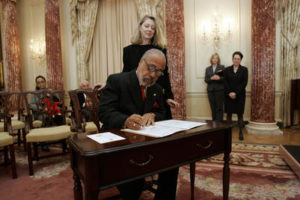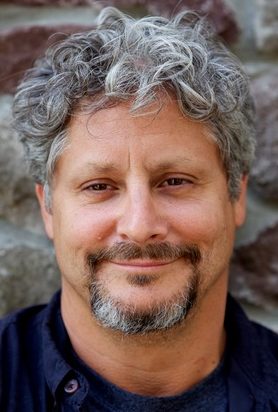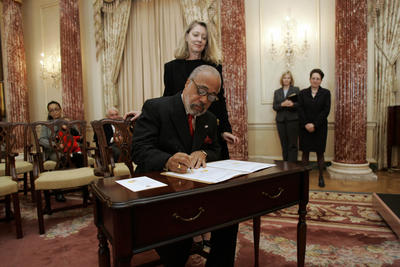By Victor Greto
In 1954, Clyde Bishop knew he was different once he entered the 7th grade.
Newark schools had just been integrated, and he was the only African American in his class.
And, at the conclusion of the first marking period, his teacher, Mr. Bennett, stood the 12-year-old up at the front of the room.
“The teacher acknowledged my A average,” Bishop, 64, says. “There were others that got A’s, too, but he deliberately pointed me out. I’ll never forget that.”
Bishop had grown up in a small, black enclave in the segregated Newark of the 1940s, centered on Cleveland and New London avenues just past the railroad tracks.
His father, also named Clyde, died of a stroke when he was three. During the very year he integrated into the public school lives of whites his own age, his mother, who had consistently urged education on her children as the way out of poverty, died of the same condition.
Parentless, but with four older sisters — the youngest of whom, Claudette, was seven years older — he left Newark soon after his mother died for Japan to live for two years. He moved in with his sister Margaret and her husband Alfred, who was in the military and stationed there.
Eventually, Bishop would hop around different locations as a teenager, foreshadowing a life in the Foreign Service that brought him to live for several years each in Italy, Hong Kong, India, South Korea, the Dominican Republic and Brazil.
“For him and me it was a good experience,” says Margaret. Because she and her now ex-husband adopted Bishop so he could receive the benefits of living in a military family, Margaret is both Clyde’s sister and adoptive mother.
“Losing our father and mother, my ex became like a brother and a role model of a father, and Clyde saw that if you work hard things will come to you,” Margaret says. “When Clyde first met my husband, [Alfred] was an enlisted man, but he got to be an officer, and Clyde saw that.”
If there is one thing that Clyde Bishop has learned over more than six decades, it’s that living overseas can give one perspective.
A member of the U.S. State Department’s Foreign Service for 25 years, Bishop was sworn in as United States Ambassador to the Republic of the Marshall Islands, a country of islands and atolls in the western Pacific Ocean. The office of ambassador is considered to be the pinnacle of his profession.

“The word that comes to mind for Clyde, beyond our professional association, is authenticity,” says Barry Wells, an assistant secretary in the U.S. State Department’s office of Equal Employment Opportunity and Civil Rights. “He’s self-effacing, honest and straightforward. That’s not easily found in people.”
****
He could just as easily have failed, Bishop says.
“Moving to Japan put a male figure in my life for the first time,” he says. “If I hadn’t gone, I would have succumbed to the influences of the community.”
Three of his closest friends from his early days in Newark ended up in trouble, he says, including one who died from drug abuse.
Although everyone stressed education in such a restricted community, the one school that blacks could attend in Newark was cramped.
“There were about four classrooms and a library, and it usually was two classes to a room,” says Clyde’s sister Claudette.
That school, which taught classes from the First through the Eighth grades, now houses the George Wilson Community Center. Once graduating from Eighth grade, most blacks were forced to go to Wilmington and attend Howard High School.
“Most of your recreation had to be centered in the neighborhood because we couldn’t participate in the movies downtown or on Main Street,” Claudette says. “But we had a community center, and the churches.”
It was galling to walk down Newark’s streets, see the movies playing at the State Theater and not be able to go see them, Bishops says.
It was galling not to be able to sit at lunch counters and be served like everyone else, even though white shop owners were happy to take their money at other stores.
“When we crossed the tracks we were in a different world,” Bishop says.
But Bishop also sees that black community as charmingly “self-sufficient,” recalling swimming and fishing in White Clay Creek, hanging out with his friends, and being happy.
“My perspective was limited,” he says, “so there was no comparison to make. It’s something you grow up with and assume it’s natural.”
His attitude, his family says, reflects his personality.
If there is a common thread from others’ observations of Bishop, it is the diplomat’s low-key nature.
“I think he took after my grandfather,” Claudette says. “Always the same, never boastful, an easygoing guy.”
Integration, and, soon after, Japan and his adoptive parents’ military lifestyle, however, changed Bishop’s perspective.
When he first entered an integrated 7th grade, Bishop recalls no overt prejudice, but, “I became aware of where I was on the economic ladder,” he says. “You see kids who change their pants everyday. Culturally, you learn that you speak differently.”
The experience of both segregation and integration taught Bishop powerful lessons for his future role as a diplomat, says Wells of the State Department.
“For many of us who came out of that era, there’s an odd twist, almost an advantage to understanding the human condition,” he says. “As a matter of survival skill at an early age, you listen to everything with a third ear, and look behind and around what is in front of you.”
Despite the closeness of the community, Bishop says his mother, who cleaned houses for a living, worked all of the time.
“There was not a lot of oversight,” he says, “and that was true of others in the neighborhood.”
That fact drives his pessimism about his own prospects if he had stayed in the community.
Claudette, however, believes Clyde would not have ended badly if he had stayed.
“I don’t think he would have because of family support,” she says.
Even more so, it was her mother’s and community’s fixation on education that would have driven a boy with Clyde’s personality and intellectual ability out and up, Margaret says.
“Mom made sure we were going to school,” she says. “Lots of teachers were role models back in those days in Newark. The black community wasn’t large, so everyone was interested in seeing you do well. I think that’s where Clyde got the education instilled in him.”
But there’s no way around the fact that getting out of Newark as he entered his teens made things better for him, Claudette says.
“It exposed him to other, better opportunities than in Delaware,” she says.
****
One of Clyde Bishop’s chores at his home in Japan was polishing his new father’s shoes.
The 6’-1” Army captain had 20 pairs of them, and the first time he polished them, Bishop skimped on the ones in the back. Of course, those were the first ones Alfred Cave looked at.
Bishop was grounded.
“Discipline, guidance — and a little fear,” Bishop describes his life with his new family. The experience, he says, repeatedly taught him lessons that haven’t left him, from doing things the right way the first time to being given the confidence to make up his own mind.
He attended church with his family until he turned 16. He got up late one Sunday, Bishop says, didn’t go, and his father didn’t say a word.
As the day passed, “The suspense was killing me,” he says. But Cave didn’t holler at him. After Bishop broached the subject, “He told me, ‘You’re old enough to make up your own mind.’”
In the Army, Bishop says, race was not a factor. And the moving around “helped me because I’m generally timid.” Meeting new people every year or two forces you to become engaged, he says.
The family moved from Japan to New Jersey to Washington, D.C.
Bishop graduated from Anacostia High School in Washington, and decided to attend Delaware State College in Dover (now Delaware State University, a historically black institution), from where he graduated in 1964 with a degree in sociology.
He picked sociology because he had to pick something, he says. “I just knew I had to go to college.”
But he loved the intimacy of the school and the teachers there, despite his penchant for daydreaming about girls. He had sailed through his senior year in high school, and discovered he could not do that in college, at least with certain teachers.
The decision to go to DSU also was economical, he says. Two of his sisters had attended. “No one said to try anywhere else.”
After he graduated, he sent letters to each Fortune 500 company, and got 10 responses back, all of which said no.
He joined the National Guard, and then worked briefly for General Motors in Newark, until he discovered that he really wasn’t corporate material. “I wouldn’t work weekends,” he says.
He also was in love. During the year he served as a probation officer with the Family Court of Delaware in Wilmington in 1966, he married Michaele Dixon, a woman he met in college. They had their first child, Sean, two years later.
While in Wilmington, he was offered a job in Salisbury, Md., as a human resource specialist for the Delmarva Advisory Council.
“I accepted the job without even knowing where Salisbury was,” he says.
There he learned a couple of lessons in racism, both while looking for a place to live, and while doing his job.
“Salisbury was a throwback to the past,” Bishop says. No realtor would sell him a house in several sections of town.
“I just didn’t understand it,” he says. Although the town eventually found him a home in a black neighborhood, “I was angry, and a little bit surprised.”
But it became one of the most satisfying jobs of his career because during the single year he worked there he forced the local representative of the Federal Housing Authority to make loans to local black farmers, which had never been done before. He even got the man fired.
But he left soon afterward because of threatening phone calls his family received at the house, he says.
He continued to jump yearly from job to job, next as a student counselor with Delaware Technical and Community College, then in Wilmington as executive director with Project Equality of Delmarva, Inc., investigating the ethical dealings of businesses for local churches who wanted to invest in them.
“I get bored easily,” he says. “I had to have a job because I had responsibilities.”
He decided his options were to get another job, or “hide in school.”
****
He hid in school, at the cost of his marriage.
During the late 1960s and early 1970s, Bishop studied urban affairs at the University of Delaware, where he learned from, debated and drank with fellow students and teachers.
“Instead of being home, I was out at the beer garden,” Bishop says.
“We used to have arguments on the extent to which individuals or organizations could affect world situations,” says Bishop’s friend, Bill Lustfield, a retired DSU professor who attended graduate school at the University of Delaware during this time with Bishop.
“I came out with the classic, the world will change by itself,” he says. “He’d say no. He thought we could make an impact. I was very pessimistic. I thought the forces are beyond human control, whatever they are.”
Although the Vietnam anti-war movement broke out around them, they were mostly caught up in graduate classes, Lustfield said.
There also were lighter, perhaps more telling, moments.
“Clyde had an old MGB, a convertible without a top,” Lustfield says. “We had a 9 o’clock class and it was winter, and we were sitting in it with no top and it’s snowing and we’re at a stop light. I turned to him. ‘You know what this looks like,’ I said, and he said, ‘Shut up and keep looking forward.’”
Even Bishop’s son Sean recalls the car with no top and rusted floorboards.
More importantly, he recalls what his father told him.
“Just after the split he told me that he wasn’t quite sure how to be a father, but he did know how to be my friend,” says Sean, who lives in Atlanta. “He trusted me to know what the right way was to go.”
A second child, Jeanne, was born just before the couple broke up.
“My parents separated when I was a year and a half,” says Jeanne, who lives in Newark and works as a social worker with New Castle County’s Children and Families First.
“It didn’t dawn on me until the Second grade that everyone didn’t visit their dad every other week,” she says. “What that drove home to me is that whatever a child’s situation, that’s what’s normal to them. That helped me understand that in my business now.”
Bishop met his second wife, Cynthia DePaulo, while attending graduate school. She was earning an undergraduate degree in anthropology.
After he earned his doctorate in urban affairs from UD in 1976, Bishop taught at DSU for several years, and chaired its department of sociology and urban affairs.
But he got restless again.
For a year in 1980, he commuted to New York from Philadelphia as an operations manager for an insurance company called New Life Group.
But on his way home one evening on the train, he read a story about the foreign service in “Black Enterprise” magazine and filled out the card for more information.
It changed his life.
****
Seen from a distance of a quarter century, Bishop’s career in the Foreign Service — made up of about 200 ambassadors and 9,000 employees — of the U.S. State Department seems a natural fit.
What other job works to prevent the onset of boredom by taking you to a different country every three years or so to make friends and influence people?
Even during the extensive written and oral examination, Bishop impressed his interlocutors by honestly telling them, when asked, that he knew nothing about the Mexican economy.
“They said they would rephrase the question,” Bishop says. “I said, ‘Even if you rephrase it, I still don’t know anything about it.’ They were impressed that I told them I didn’t know.”
On average, Bishop has changed jobs and countries every three years, from stints in Palermo, Sicily to Seoul, South Korea, Rio de Janeiro, Brazil to Naples, Italy. He was assigned to Hong Kong during the year it transferred into China’s hands in 1997.
The summer before he went off to his first assignment in Sicily in late 1981, he married Cynthia DePaulo. In fact, he had requested Sicily as one of his top assignment choices because it was home to Cynthia’s paternal roots.
If going to a different place in the world every three years was great for a man who got bored easily, it opened up worlds for his two children.
“It’s given me perspective on a lot of different cultures,” says Sean, who stayed for eight years in Brazil, long after his father left; Sean married a woman he met there.
“You realize that people around the world are the same,” he says. “It’s just how they express it that’s different.”
Jeanne says it gave her life its direction.
“It made us different people,” she says of herself and her brother. “We have a more broad sense of what the world is like, and see beyond our surroundings.”
Even Cynthia, whose high-key personality contrasts radically with her husband’s, says the moving is exhausting, “but I love the change, the challenge and the diversity.”
There are drawbacks.
Bishop says he rarely returns to places he’s been assigned.
“I’m never sure that they are friends because of what I am or who I am,” he says, “and sometimes I don’t want to find out.”
He expects his new job as ambassador to the Republic of the Marshall Islands to last at least three years, the average length of time for an assignment.
He may even “hang it all up” when he’s done, he says.
Which means he may not leave. After all, one of his dreams was to end up on a beach with a beer in his hand.
For that, the Marshall Islands – located in the western Pacific Ocean and with a year-round temperature of between 70 and 80 degrees — is made to order. Sort of.
Comprised of five major islands and more than two dozens atolls or extinct volcanic islands and dozens of tinier islands, the country had been the site of many American nuclear bomb tests, the most famous of which — a 15-megaton hydrogen bomb, more than 1,000 times as powerful as the atomic bomb dropped on Hiroshima — was detonated at Bikini Atoll on March 1, 1954.
The country had been taken over from Japan by the U.S. during World War II, but released from U.S. control in 1986. Most of its economy is supported by U.S. aid, and there is a major American air base there.
Although there are many pristine beaches, Bishop says he’s not going to find much time to go. His job often entails 10- 12-hour days, from the office — where he will supervise 20 underlings — to attending evening functions.
“It’s a great life,” Bishop says of the latest stage of his career.
His smile, framed by a closely-cropped beard, opens his face to express an ambassadorial sincerity and directness. “And none of it was planned.”

